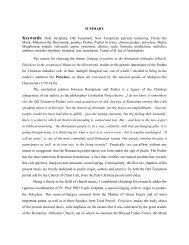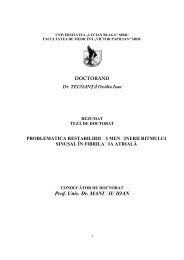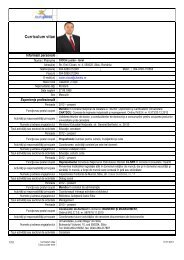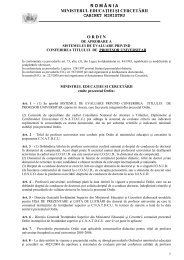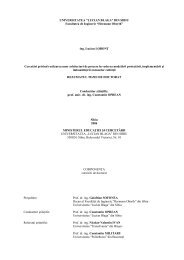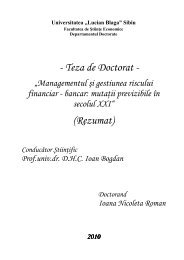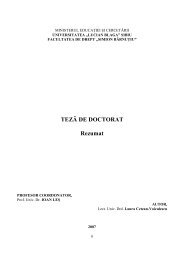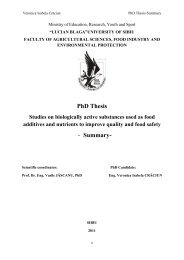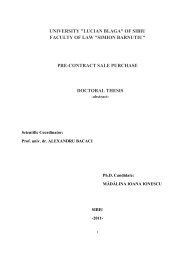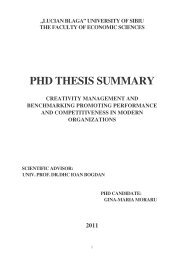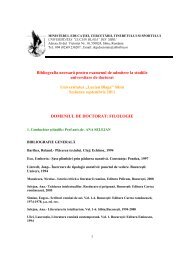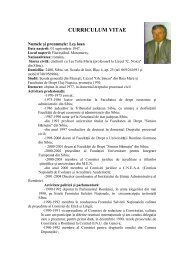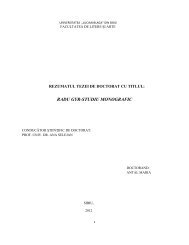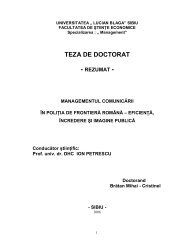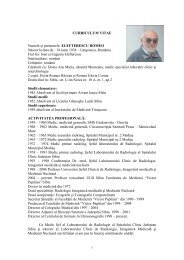portrayal, but one based on significant details. Characters such as Ion Marina(Cunoaştere de noapte), Paul Achim (Iluminări), Dumitru Vinea (Păsările) arepresented by means of a superlative prosopography, allu<strong>din</strong>g to their strongpersonality and important position. A different category is represented by thosecharacters whose presentation is marked by the signs of a slightly flawed perfection.This the case of Liviu Dunca (Păsările), Ilie Chindriş (Interval), Paul Dunca (Apa).But there are also physical portrayals which touch caricature, especially in the case ofthose perfectly loyal to the party authority, people without vocation, always ready torenounce their own principles to keep positions. This category includes Dinoiu andNiculaie Gheorghe from Iluminări, Valeriu Trotuşanu from Cunoaştere de noapte,Octavian Grigorescu from Apa.An interesting fact we have noticed as far as characters are concerned regardsthe way names are used. In Ivasiuc’s fiction, characters are called in perfectcompliance with the identity the author wants to build for them at the exterior level.Thus, they are identified and then called by means of the surname most of the timesaccompanied by the first name or preceded by a title; as a consequence, the referencesalways sound extremely official: comrade Ion Marina, comrade Paul Achim, dr.Stroescu, professor Ghimuş etc. The exceptions are extremely few and, from ourperspective, they are used to give characters a human dimension, to place themoutside conventions or family connections or to caricature them.In the subchapter The revelation of the exiled self through the discovery of theinner self we have emphasized the characters’ social portrayal we have referred to inthe previous subchapter is but the starting point in the analysis Alexandru Ivasiucmakes at the level of the character’s deep structure by depicting him beyond thesurface and automatisms of daily life.The technique Alexandru Ivasiuc places the stake on in all the novels is that ofthe contrast, of the obvious opposition between appearance and essence, given that thecharacters presented by means of prosopography and socium as real winners areexactly the contrary. The characters’ apparent balance is disturbed by the apparition intheir life of something unexpected, which deters them from their habits, endangeringtheir control over reality: dr. Ilea (Vestibul) falls in love with a student thirty years hissenior, Ilie Chindriş (Interval) meets his former girl friend, Olga, after twelve years, towhose expellment from the faculty (on the grounds of ideological reasons) he hadhimself contributed, Ion Marina (Cunoaştere de noapte) find out about his wife’s22
imminent death, Dumitru Vinea (Păsările) feels responsible for the death of a workerin the factory, Liviu Dunca (Păsările) enters the crisis when he is pressured to supportan accusation he does not believe in, Paul Achim (Iluminări) is attracted by a youngresearcher in the institute, Nora Munteanu, but he also discovers an ironic hint behinda seemingly innocent question he is asked at an important congress, Paul Dunca (Apa)revolts against the order represented by the traditional family and the bourgeois wayof living, entering the reach of Piticu’s group, Miguel’s inner balance (Racul) isstrongly affected when he accepts the Don Athanasios’s diabolic plan and becomesaware of the absolute control this one holds.These situations mark deep changes in the characters’ lives. Their actions andthoughts rendered either from the perspective of an outsider or from that of thecharacter himself prove the lack of the will they once had and, consequently, theirinability to act and react in the manner they used to. The characters’ existential crisisbegins by what Karl Jaspers 21 called “the astonishment stage”, the charactersbecoming aware of the rigid norms and of the inner struggle following he discovery ofthe diversity of life.This important moment in the characters’ lives is used by the author to focuson the characters’ inner life, as he progressively abandons the depiction of exteriorsigns. The characters’ inner discourse encompasses the description of their feelingswhen discovering the new reality, but also the evocation of the past and itsretrospective interpretation.The extraor<strong>din</strong>ary intuition Ivasiuc had, in our opinion, was that of buil<strong>din</strong>gthe main characters (dr. Ilea, Ilie Chindriş, Ion Marina, Liviu Dunca, Dumitru Vinea,Paul Achim) retrospectively by means of revealing their past, by what Virginia Woolfcalled the “tunnelling process” 22 . The characters reach to move on the dialecticaltrajectory evoking present – evoked past, so that they attempt at explaining attitudesand feelings from the present by re-interpreting past events full of symbolicsignificance. Cristian Moraru states that the characters tell their past not to analysetheir feelings, but to look for that alienating something in the past that couldilluminate their present 23 .21 Karl Jaspers, Texte filosofice, Editura Politică, Bucureşti, 1986, pp. 5-11;22 Virginia Woolf, A Writer’s Diary, A Writer's Diary, The Hogarth Press, London, 1959, p. 160;23 Op.cit., p. 41;23
- Page 2 and 3: TABLE OF CONTENTSINTRODUCTION .....
- Page 4 and 5: SUMMARYThe doctoral thesis Narrativ
- Page 6 and 7: politics in Romania revealed the au
- Page 8 and 9: names began to emerge: Nicolae Breb
- Page 10 and 11: was awarded (two prizes of the Writ
- Page 12 and 13: with the text through the opinions
- Page 14 and 15: integrate elements involving both n
- Page 16 and 17: omniscience, from the discourse cha
- Page 18 and 19: “zero degree narratee”, any dev
- Page 20 and 21: the two main directions existing in
- Page 24 and 25: What the characters discover after
- Page 26 and 27: The analysis on the character also
- Page 28 and 29: internal, the focalized can be perc
- Page 30 and 31: Koppe 37 , that the relation focali
- Page 32 and 33: epresented by a proliferation of an
- Page 34 and 35: BIBLIOGRAPHYI. OPERA LUI ALEXANDRU
- Page 36 and 37: 6. Popescu-Neveanu, Paul, Dicţiona
- Page 39 and 40: 45. Neagu, Fănuş, Cartea cu priet
- Page 41 and 42: 21. Călinescu, George, Scriitori s
- Page 43 and 44: 60. Iser, Wolfgang, The Implied Rea
- Page 45 and 46: 98. Pârvulescu, Ioana, Prejudecă
- Page 47 and 48: 140. Selejan, Ana, Literatura româ
- Page 49 and 50: 14. Dimisianu, Gabriel, USR sau SSR
- Page 51 and 52: 3. Blandiana, Ana, Scriitorul şi P
- Page 53 and 54: 25. Pier, John, La narratologie all



